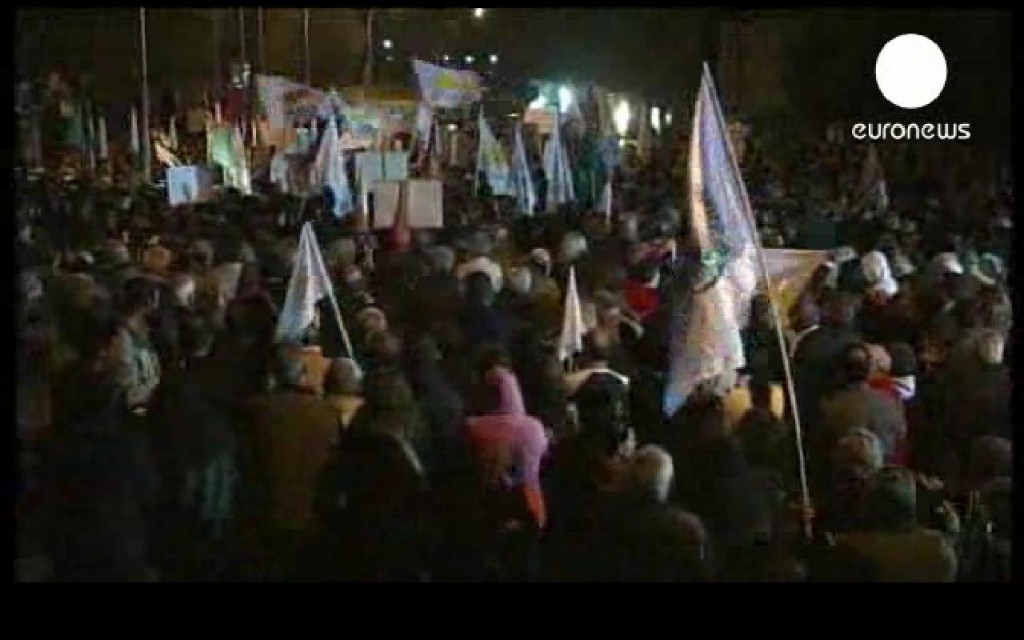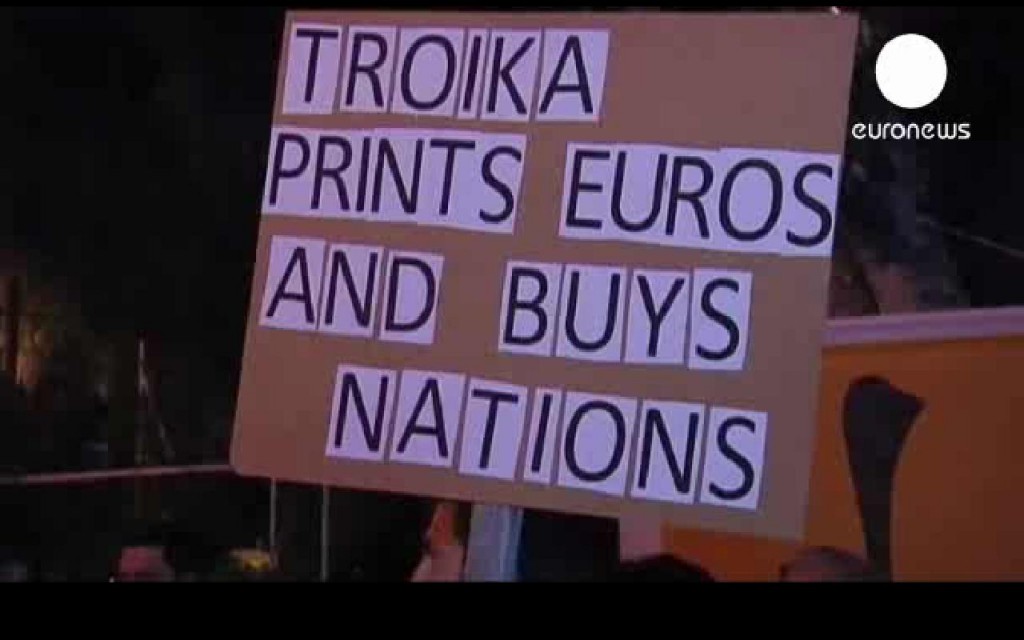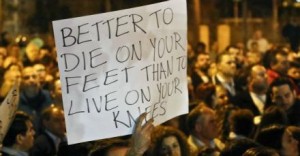2nd Largest Bank Tanked – International Crises Looms as Russia, Turkey, EU and Plutocrats Maneuver To Control Gas Reserves
Deposits Over $100,000 To Be Robbed Up To 40% By E.U., IMF
by Walter Smolarek – LiberationNews.org

Cypriot President Nicos Anastasiades
As the global economic crisis—now in its sixth year—drags on, the rich and powerful are still sticking with the same old formula: Do whatever is necessary to save the banks and make poor and working people pay, one way or another. In recent days, a looming financial collapse in the Eastern Mediterranean island country of Cyprus emerged as the latest flashpoint.
In February 2012, a second bailout for Greece included a partial default of the country’s debt, called—euphemistically—a “haircut” and also “private sector involvement.” This was supposed to help make the debt sustainable and avert Greece’s exit from the Eurozone, which would likely have far worse consequences for the finance capitalists involved in the deal.
Last year’s default imposed major losses on Cyprus’s biggest banks, which had used large amounts of its depositors’ money to “invest” in Greek bonds. Cyprus then became the fifth country in the Eurozone—the 17 countries that use the euro currency—to seek international assistance for bailing out its banks. The bailout money required—eventually amounting to 10 billion euros (about $13 billion)—was to be provided by the “troika”—a bloc composed of the International Monetary Fund, European Central Bank and European Union.
Cyprus—outside of the Turkish-controlled northern section of the island—has close political, economic and cultural ties with Greece, almost to the point of being a protectorate. The Cypriot banking sector has been teetering on the verge of collapse ever since the effects of the partial default began to be felt. The fear among the rulers of Europe is that this would cause a full sovereign default and force Cyprus out of the Eurozone, a politically unprecedented development that would have potentially devastating ripple effects.
Cyprus, with a population of roughly 1 million, is among the smallest countries to use the common currency. Since 2009, the Eurozone has been consumed by what has been termed a “debt crisis” that has sent unemployment rates, poverty and general misery skyrocketing across Europe. Although the corporate media portrays the situation as a consequence of out-of-control social spending, the Eurozone is suffering from the generalized effects of the world crisis of capitalism exacerbated by high levels of government borrowing, financial speculation on that debt and the highly uneven development of member states.
From 2008 until the end of February, Cyprus was led by President Dimitris Christofias of the Progressive Party of Working People (AKEL). Although AKEL refers to itself as a communist party—Christofias himself received his doctorate in the Soviet Union—it has adopted a bourgeois electoral and parliamentary approach to dealing with the island nation’s debt crisis. Christofias put through three austerity packages but was unwilling to accept the troika’s terms for a bailout deal.
Nicos Anastasiades of the right-wing Democratic Rally party promised in the lead-up to the February election to negotiate an acceptable deal with the troika. This enabled him to beat the AKEL candidate and become the new president of Cyprus. Anastasiades signaled his intention to finalize a bailout deal as soon as possible and immediately began intensive negotiations.
‘Bail-in’
Last week, Anastasiades announced that he had reached a jarring agreement with the troika. In return for the troika’s bailout money, Cyprus would have to conduct a “bail-in” and seize 6.7 to 9.9 percent of all bank deposits in the country to raise 5.8 billion euros (about $7.5 billion). Doing away with the veneer of “competitiveness,” “restructuring” and “fiscal adjustment” that other austerity measures have been cloaked in, the troika proposed outright theft that would be felt most by poor and working people.
However, the prospect of such blatant robbery was rejected by virtually all sections of Cypriot society. The working class was outraged that what little savings they had managed to scrape together would be diminished to pay for the capitalists’ crisis. But the ruling class in Cyprus also feared losing their recognition as a tax haven for offshore millionaires and billionaires—a cornerstone of the Cypriot economy.
The parliament of Cyprus bowed to this near-unanimous domestic pressure and refused to endorse the plan—President Anastasiades’ deputies abstained and every other lawmaker voted no. The crisis reached its peak as the country’s banks were closed to prevent massive withdrawals and capital flight.
Referring to German Chancellor Angela Merkel, the Cypriot president reportedly told European Economic and Monetary Affairs Commissioner Olli Rehn: “When I warned you that there would not be a parliamentary majority to pass the agreement, you didn’t want to listen. Give my regards to Mrs. Merkel.” At a subsequent meeting of European finance ministry officials, a French representative lamented, “The [Cypriot] parliament is obviously too emotional and will not decide on anything.”
Plan B
The government of Cyprus, scrambling to avert a default and Eurozone exit, pursued a multifaceted bargaining strategy in an attempt to force the troika to soften its demands. It proposed stealing pension funds and publicly owned state assets to create an outrageously named “solidarity fund,” which would also include assets from the Church of Cyprus. This was supposed to raise the 5.8 billion euros required by the troika and render the “bail-in” unnecessary.
The Cypriot government also attempted to leverage the hundreds of billions of cubic meters of natural gas recently discovered in the waters south of the island nation. It was prepared to offer large stakes in future gas production to capitalists willing to immediately put up the money. Many portrayed the sale of gas reserves, which rightfully belong to the Cypriot people, as Cyprus’s ace in the hole.
However, there are several problems that made this proposal ultimately untenable. First of all, the necessary infrastructure—which would cost at least $36 billion—would not be in place until at least 2018 to begin production. At that point, the market will likely be flooded with gas from the United States, Australia and parts of Africa, largely due to the explosion in the practice of hydraulic fracturing or “fracking.” Finally, Turkey, which has effectively controlled Northern Cyprus since a war in 1974, is likely to launch an immediate and aggressive legal challenge to the South’s right to exploit the gas reserves.
President Anastasiades hoped to play Russia and the European Union against each other to strengthen his own bargaining position, weakening the troika by exploring the possibility of a Russian-financed bailout.
Politically, President Anastasiades hoped to play Russia and the European Union against each other to strengthen his own bargaining position, weakening the troika by exploring the possibility of a Russian-financed bailout. These two world powers have conflicting geo-strategic interests, finding themselves on opposite sides of major developments like the civil war in Syria and NATO’s “defensive” missile shield in Eastern Europe. Russia sees in the Eurozone debt crisis an opportunity to expand its influence. It already extended a $3.3 billion loan to Cyprus in 2011, and Russian state energy company Gazprom has made moves to acquire the Greek national gas company DEPA, which is, ironically, slated for privatization under orders from the troika.
Russian deposits larger than GDP
Many Russian oligarchs stash huge sums of money in Cypriot banks to evade taxes—amounting to $26 billion, which is larger than the Cyprus’s entire GDP. This gives Russia a tangible economic interest in the stabilization of Cyprus’s economy. The Russian ruling class bitterly opposes the idea of a deposit tax, especially on large accounts
However, Cypriot overtures to Russia were ultimately unsuccessful as diplomats were unimpressed at offers of partial control over the island country’s gas reserves. Some members of the Russian capitalist class also seemed to be confident that they could avoid losing up to 40% of their deposits. Prominent millionaire Alexander Lebedev dismissed the issue as “not worth talking about.” He added: “Cyprus was always a transit jurisdiction—money would pass through and then go to Lithuania, Latvia, Belize, Switzerland, everywhere. There are plenty of ways [to avoid capital controls]. … Certain schemes can be put into place.”
The Russian government nevertheless continues to take a politically assertive stance, warning the troika that it may swap a part of its foreign reserves held in euros for another currency.
‘Bail-in’ retained in modified form
With the European Central Bank threatening to cut off massive cash infusions, called Emergency Liquidity Assistance, the Cypriot president turned back to the troika for the desperately needed bailout money and finally reached a deal on March 25. The “bail-in” deposit tax was retained in the final version but in a modified form- affecting up to 40% of deposits of more than 100,000 euros (about $128,000). While this may seem like a pro-worker decision, it simply sets the stage for the kind of devastating attacks on the rights of poor and working people in Cyprus that have already been seen across Europe. The capitalist rulers of the Eurozone also seem to have wanted to punish Russia for meddling in its sphere of influence.
Under the deal, the second largest Cypriot bank, Laiki, is to be dissolved and split into a “good” bank composed of its profitable assets and a “bad” bank made up of its nonperforming investments. The “good” bank is to be absorbed by the country’s largest bank, Bank of Cyprus, which will now enjoy nearly unchallenged monopoly status—further proving the Marxist assertion that capital consolidation intensifies during periods of economic crisis.
As usual, European politicians and corporate media commentators refer to the bailout deal as a conclusive settlement to the crisis. This, however, is far from the truth. The Cypriot economy is likely to be plunged into a severe recession as a result of this financial meltdown, further weakening the banking sector and calling into question the effectiveness of the agreement that was just reached. As European Union Economic and Financial Committee Chairman Thomas Wieser bluntly put it at a Eurozone meeting a few days prior to the finalization of the bailout agreement, “The economy is going to tank in Cyprus no matter what.”
As capitalist politicians use the livelihoods of poor and working people in Cyprus as bargaining chips, the only available avenue for struggle is militant, persistent and organized mass action. The rulers of the Eurozone hold all the cards at the negotiating table, but the people have the power in the streets.
Check out LiberationNews.org for more articles on the E.U. crises and other financial topics.
 The “Troika of Doom”, the European Central Bank, the European Union, and the International Monetary Fund (IMF) Sign A Deal With the President of Cyprus Nicos Anastasiades.
The “Troika of Doom”, the European Central Bank, the European Union, and the International Monetary Fund (IMF) Sign A Deal With the President of Cyprus Nicos Anastasiades.




